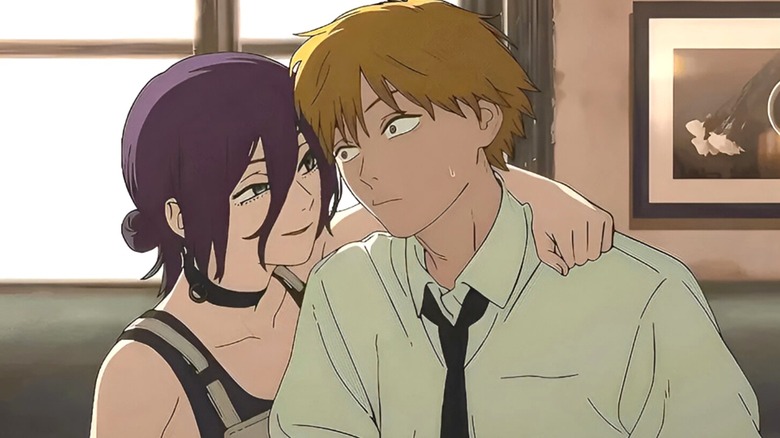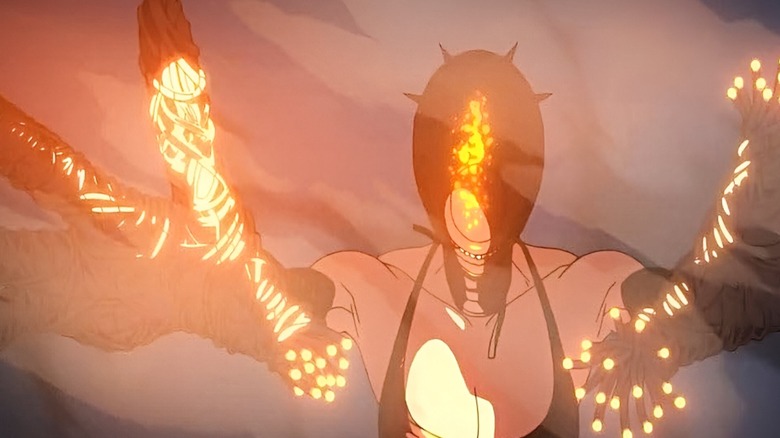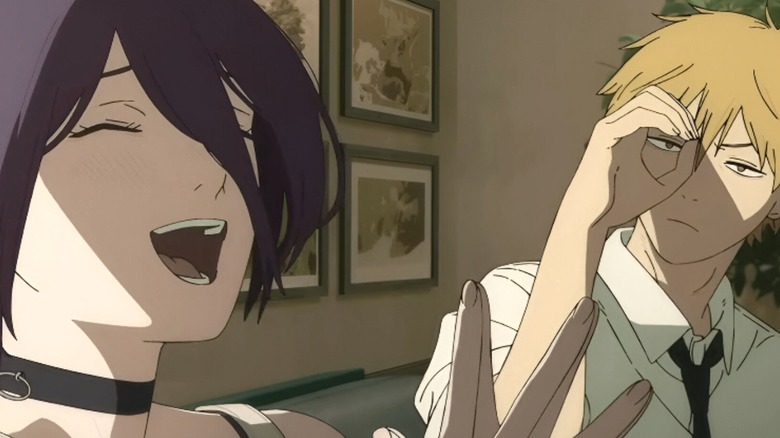The Chainsaw Man Movie Breaks The Anime Mold By Subverting A Classic Trope
This post contains major spoilers for "Chainsaw Man – The Movie: Reze Arc."
Shonen manga/anime (action-fueled stories that are primarily aimed at a young male demographic) have always had a female character problem. Even the most promising, well-written arcs often feature female protagonists who are reduced to their sexuality or their status as a love interest. In cases where they're afforded a bit of depth, they're deliberately written as helpless or underpowered to strike a contrast with the aspirational heroism of their male counterparts. There are exceptions to the rule, of course, but this glaring issue has been normalized enough to have evolved into an expected trope. While more mainstream shonen entries are veering away from such clichés, it is rare to see genre examples with complex, well-written characters across the board.
Tatsuki Fujimoto's "Chainsaw Man" manga has broken the mold since its first serialized issue, setting both Makima and Power up as Denji's potential love interests, only to completely subvert expectations. Fujimoto's brilliantly layered storytelling deserves all the credit here, as Denji was never meant to be a conventional shonen protagonist, even though he fulfills the mantle of "hero" in certain ways. Even beyond Makima and Power, every female character introduced in the manga (so far) is afforded nuance without being typecast into gendered roles. As Reze is also given the same treatment, this sets "Chainsaw Man – The Movie: Reze Arc" apart from most genre entries, in which female characters still struggle to stand on equal footing.
Reze is presented as the sweet, playful love interest who helps Denji form his first formative experience of adolescent love — but this is only a front to hide something more twisted and tragic.
Chainsaw Man's Reze arc inverts the romantic status quo
Denji seeks refuge inside a telephone booth while it's raining, but the small space is soon occupied by another presence: the warm, jovial Reze, who blushes as soon as she meets Denji's eyes. Denji, whose fixation on Makima is a result of his need to feel loved and valued, is immediately disarmed by this frank display of interest and affection. Despite being torn, Denji is immediately drawn to this girl, who injects joy into every moment they spend together and teaches Denji how to read and swim, among other things. However, Reze's fulfillment of these gendered tropes is just a shrewd performance — she is no infatuated teenager, but a trained killer on a mission to take Chainsaw Man's heart.
On learning the truth, we realize that every endearing quality we associate with Reze is a lie (or at least, a half-truth). Nothing, from their rainy day meet-cute to first-kiss-beneath-the-fireworks, is heartfelt or organic. Denji, of course, is none the wiser until Reze bites his mouth bloody mid-kiss, causing him to stumble backwards in shock as she slits his throat. She isn't fragile or helpless: she is the Bomb Devil, capable of morphing her body into an endless barrage of explosives, missiles, and grenades that are powerful enough to devastate an entire city. We glimpse this terrifying strength when Reze tackles a crazed murderer and strangles him to death with her bare hands, having lured him into a false sense of security by pretending to be weak.
Reze is formidable enough to fight (and kill) droves of Public Safety officials while being fixated on fulfilling her mission. Her attacks are quick, ruthless, and devastating, leaving a memorable impression long after she's gone.
Reze's vulnerability isn't a tacked-on afterthought in the Chainsaw Man movie
Reze might not give in to trite sentimentality, but she is a teenager with repressed vulnerabilities who was never given the chance to act her age. Being a military weapon, Reze has always put her missions above her personal desires and hid behind fabricated personas. Denji's circumstances mirror her own, as this 16-year-old boy experienced the most traumatic childhood imaginable and is still being used as a pawn by those around him.
But Denji's circumstances don't demand duplicity from him — if anything, he is honest to a fault, which allows others to take advantage of his stunted self-perception. Denji's offer to run away with Reze even after he learns the truth rattles her, yet it's emblematic of his sweet naivete.
While Reze doesn't necessarily have romantic feelings towards Denji, she feels an empathetic bond with him as they've both been deprived of basic necessities, like schooling. Denji's predicament is worse in many ways; Reze points out that a kid shouldn't be working for Public Safety, or agree to be an obedient lackey in exchange for three meals a day. But the promise of warm food and a bed is a luxury for Denji, who grew up in abject poverty and even sold his eye (plus a kidney and testicle!) to pay off his father's debt. Reze's backstory isn't clear to us, but it is safe to assume that it was similarly difficult, which is why the dream of running away together feels so tempting to her in the end.
Before tragedy strikes, Reze's final act is rooted in radical empathy and a desperate desire to freely embrace who she is. Her complex, enigmatic presence will surely be missed.


